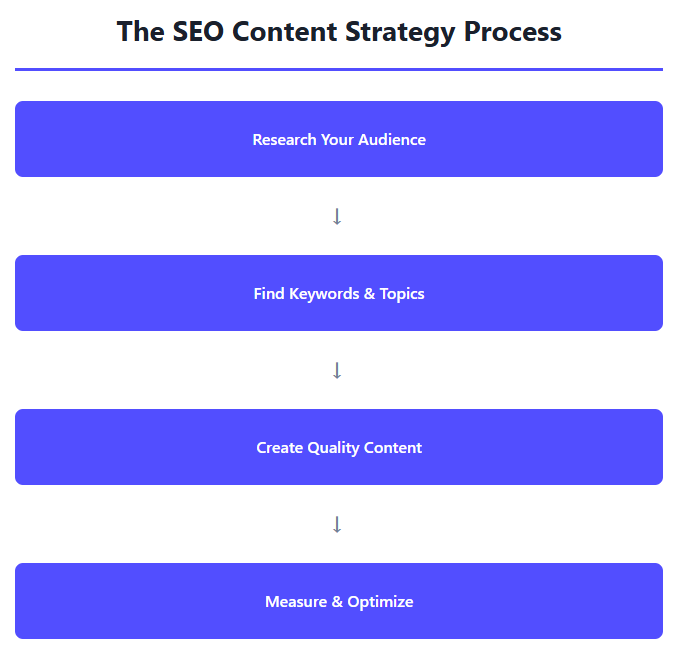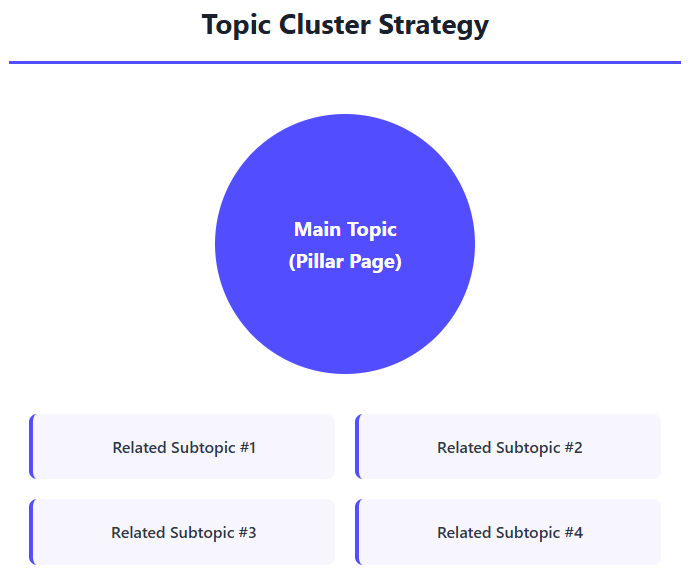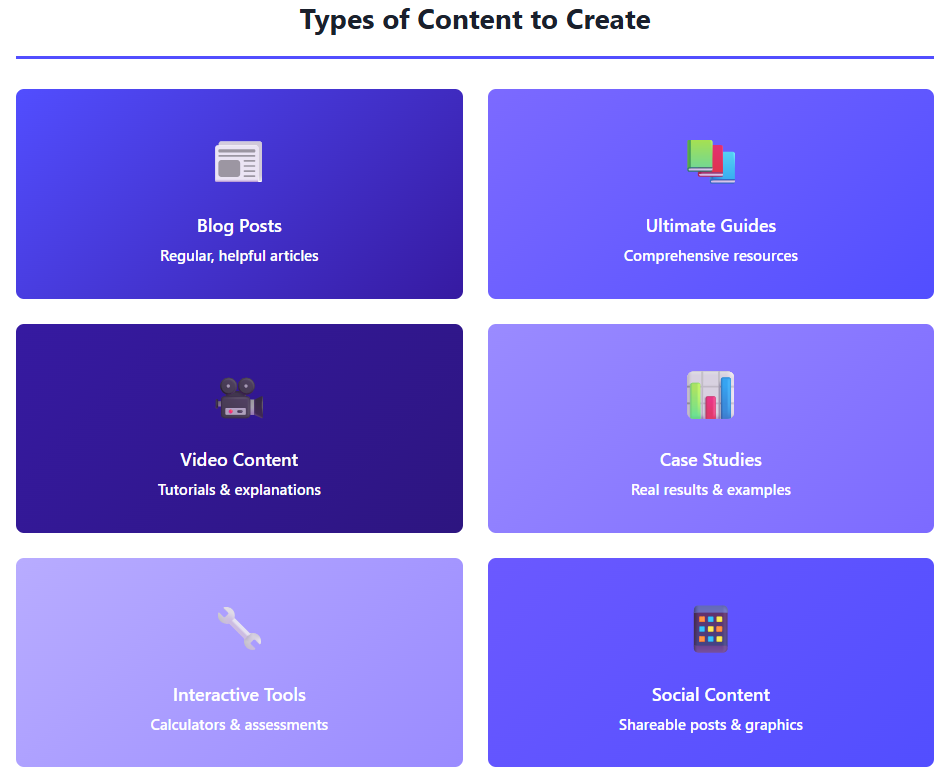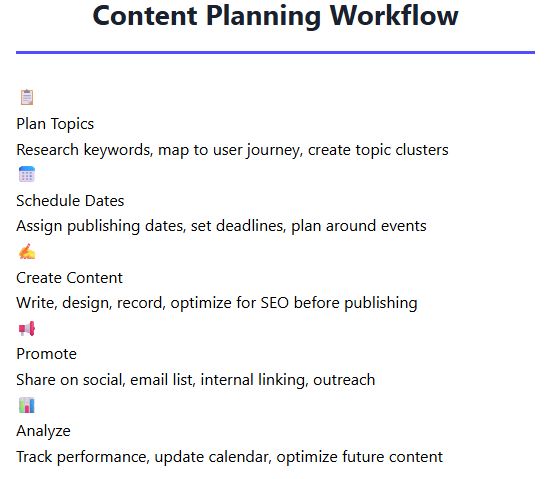- What Is an SEO Content Strategy, Really?
- Why You Can't Afford to Wing It Anymore
- Start Here: Define Your Niche and Audience (Get Hyper Specific)
- Think in Topics, Not Just Keywords (The Cluster Approach)
- Master the Art of Question Research
- Turn Research Into Content That Actually Stands Out
- Don't Ignore What You've Already Built
- Set Goals That Actually Matter (Beyond Vanity Metrics)
- Write for Humans First (Google Will Reward You)
- Create Content That Keeps People Engaged
- Master Internal Linking (Your Secret SEO Weapon)
- Keep Your Strategy Dynamic and Evolving
- Build and Use an Editorial Calendar That Works
- Learn From Both Wins and Failures
- Advanced Tactics for Competitive Niches
- Final Thoughts: Building Something That Lasts
Let’s talk about something that sits right at the heart of digital marketing: your SEO content strategy.
Don’t worry if that phrase sounds stiff or overwhelming.
We’re going to unpack it in a way that’s clear, human, and yes, even enjoyable.
A solid SEO content strategy isn’t just about sprinkling in keywords or trying to please Google’s ever-changing algorithm.
It’s about navigating an ecosystem that’s shifting fast.
It’s about making sure your content is actually discoverable, genuinely helpful, engaging to read, and thoughtfully aligned with what your audience is searching for at every stage of their journey.
So, if you’ve ever wondered how to build a content plan that brings in real organic traffic, builds trust, and turns casual browsers into loyal customers, grab your favorite drink and settle in.

What Is an SEO Content Strategy, Really?
Imagine your SEO content strategy as the bridge between what your business wants to say and what people are already looking for.
It’s your master plan for showing up when someone types a question into Google, and doing it in a way that feels helpful, trustworthy, and genuinely valuable.
Let’s say you sell hiking boots. Without a strategy, you might post randomly: a staff photo from Yosemite one day, a sales announcement the next, then a dry list of product features.
That’s not necessarily bad content, but it’s not strategic. It’s scattered.
Now imagine knowing that your ideal customer is searching for “best hiking boots for beginners,” “how to break in hiking boots fast,” or “waterproof boots for rainy climates.”
Suddenly, you’re meeting them exactly where they are, with the precise content they need, when they need it most.
That’s the power of strategy. It transforms random content creation into purposeful, audience-focused publishing that builds momentum over time.
Why You Can’t Afford to Wing It Anymore
Here’s a sobering reality – there’s no shortage of content out there.

In fact, we’re drowning in it. Most of what gets published never gets seen by more than a handful of people.
To make sure your content doesn’t fall into that category, it’s worth reviewing common link building mistakes to avoid.
What separates high-performing content from those forgotten blog posts gathering digital dust? Strategy.
With a plan, you’re not just writing for the sake of hitting a publishing schedule or because someone told you “content is king.”
You’re writing with crystal-clear goals, whether that’s building brand awareness, answering customer questions, generating qualified leads, or guiding people toward a purchase decision.
You’re transforming a random collection of posts into a purposeful, connected experience that guides your audience through their entire journey with your brand.
And the payoff? Better search visibility, a growing audience that genuinely trusts your expertise, and a steady stream of organic traffic that compounds over time.
The alternative, winging it, means wasted time, scattered efforts, and content that might be good but lacks the cohesion needed to build real authority in your space.
Start Here: Define Your Niche and Audience (Get Hyper Specific)

If you’re talking to everyone, you’re talking to no one. This isn’t just marketing wisdom—it’s the foundation of effective SEO.
The first step in any winning strategy is getting laser-focused about who you’re helping and what makes your approach different.
Maybe your niche isn’t just “fitness,” but “strength training for new moms getting back into exercise.” Not just “marketing,” but “email marketing automation for online course creators who hate tech.”
Get narrow enough that your ideal audience feels seen the moment they land on your site.
Then dive deep into their world. What keeps them up at 2 AM scrolling through forums?
What language do they actually use to describe their problems, not the industry jargon you might default to? What are they frantically typing into search bars when they’re desperate for a solution?
Here’s how to gather this intelligence:
Interview your best customers. Ask them about their biggest challenges, the words they use to describe problems, and what they wished they’d known earlier in their journey.
Analyze customer reviews and support tickets. Look for patterns in language and pain points. These are goldmines for understanding real user intent.
Browse niche communities. Reddit threads, Facebook groups, industry forums, anywhere your audience gathers to ask questions and share experiences.
Study your competitors’ comment sections. What questions keep coming up? What gaps do you notice in their responses?
When your content authentically mirrors your audience’s questions, concerns, and language, that’s when you stop being just another voice in the noise and start becoming a trusted resource.
Think in Topics, Not Just Keywords (The Cluster Approach)
Here’s a fundamental shift that separates modern SEO from the old-school approach: stop thinking only in terms of individual keywords.
Start thinking in comprehensive topic clusters.
Keywords are still crucial, don’t get me wrong. But they’re just one piece of a much bigger puzzle.
Topics give your content depth, direction, and the kind of topical authority that Google increasingly rewards.
For example, if your niche is helping freelancers grow their business, your main topic pillars might include:
- Pricing and proposals (covering rate setting, negotiation, contract templates)
- Client management (onboarding, communication, boundary setting)
- Business operations (time management, invoicing, scaling)
- Marketing and growth (networking, testimonials, referral systems)
Each pillar becomes a hub for multiple pieces of content that support and link to each other, creating a web of authority around that topic.
Using keyword tools like Google Search Console, Ahrefs, SEMrush, or even Google’s autocomplete feature, you can start building out these clusters systematically.
This approach builds what SEO experts call “topical authority”—showing Google (and users) that you’re not just dropping in for quick hits, but genuinely committed to covering a subject comprehensively.

Master the Art of Question Research
Great content starts with understanding exactly what people are asking, and how they’re asking it. This is where your keyword and question research becomes detective work.
Start broad, then get specific. Type your main topics into research tools and pay attention to:
- Related searches at the bottom of Google results
- People Also Ask boxes that appear in search results
- Auto-complete suggestions as you type
- Question-based platforms like Quora, Reddit, and niche forums
- Social media groups where your audience hangs out
But here’s the key insight: instead of just chasing high-volume keywords, look for high-intent questions. You want to be the go-to answer for someone who’s ready to take action, not just browsing casually.
For instance, someone searching “email marketing” might just be learning. But someone searching “how to write email sequences that convert new subscribers” is likely ready to implement a solution. That’s your sweet spot.
Here’s how to structure your keyword research to find the right opportunities:

Pro tip: Keep a running document of questions you hear repeatedly from customers, prospects, and community members. These real-world questions often become your highest-converting content pieces.
Turn Research Into Content That Actually Stands Out
With all that research – topics, keywords, questions – it’s time to get creative. But here’s where many people stumble: they think having the right keywords is enough. It’s not.
Brainstorm blog posts, comprehensive guides, case studies, video content, and landing pages that match different types of user intent:
- Informational content for people just learning about a topic
- Comparison content for those evaluating options
- Solution-focused content for people ready to take action
- Inspiration and case study content for those who need motivation
But here’s the critical piece: it’s not enough to rehash what everyone else is saying. You need a distinctive point of view and unique value.
Maybe you’re more casual and story-driven than your competitors. Maybe you’re ultra-detailed and data-backed. Perhaps you focus on quick wins while others get lost in theory. Whatever your angle, lean into it.
Want to rank for “best email marketing platforms”? Don’t just create another generic listicle. Share your actual experience using these tools. Include screenshots of your campaigns.
Talk about what surprised you, what frustrated you, and what made the biggest difference in your results. That’s the kind of content that earns both trust and rankings.

Don’t Ignore What You’ve Already Built
Before rushing to create something brand new, stop and take inventory of what you already have. This step alone can save you months of work while dramatically improving your results.
Dig into your analytics and ask:
- What content is already performing well but could be expanded or updated?
- Which pages get decent traffic but terrible conversion rates?
- What’s ranking on page two that could break into the top ten with some quality on-site optimization?
- Which older posts cover topics that are more relevant now than when you first published them?
Updating, merging, or expanding existing content is often faster and more effective than starting from scratch. Plus, Google tends to reward sites that keep their content fresh and relevant.
Consider creating “pillar pages”—comprehensive resources that combine and expand on several related posts.
Not only does this create something more valuable for users, but it also helps consolidate ranking signals around important topics.
Set Goals That Actually Matter (Beyond Vanity Metrics)
It’s easy to get distracted by numbers that look impressive but don’t move your business forward.
Page views are nice, but do they lead to email subscribers? Social shares feel good, but do they convert to customers?
Instead, focus on metrics that connect directly to business outcomes:
For awareness goals: Track organic traffic growth, brand keyword rankings, and social mentions from your target audience.
For lead generation: Monitor email signups, content download rates, and form submissions that come from organic search.
For sales and conversion: Measure revenue attributed to organic traffic, trial signups from content, and customer acquisition cost from SEO efforts.
For engagement and authority: Look at time on page, pages per session, returning visitors, and backlinks from reputable sources.
Set specific, measurable targets for each goal and review them monthly. This keeps your strategy focused and helps you double down on what’s working while pivoting away from what isn’t.
Write for Humans First (Google Will Reward You)
SEO writing has evolved dramatically over the past few years.
Google’s algorithm updates increasingly reward content that genuinely helps users over content that’s obviously optimized for search engines.
This means your content should be:
- Easy to read with clear headlines, short paragraphs, and logical flow
- Easy to scan with bullet points, numbered lists, and descriptive subheadings
- Packed with genuine insight that goes beyond surface-level information
- Actionable with specific steps readers can take immediately
Yes, you should still include your target keyword naturally in strategic places – the headline, introduction, at least one subheading, and throughout the body. But more importantly, include related terms and concepts that help Google understand the full context of your content.
Don’t write for robots. Write for the person who found your page hoping for a real solution to a real problem.
Speak clearly, answer their questions completely, and respect their time.
Create Content That Keeps People Engaged
The best SEO content doesn’t just attract visitors, it captivates them.

Engagement signals like time on page, scroll depth, and internal clicks are increasingly important ranking factors.
Here’s how to make your content genuinely engaging:
Use storytelling to illustrate your points. People remember stories better than abstract concepts.
Include visuals that support your message with screenshots, diagrams, charts, or even simple illustrations.
Add interactive elements where they make sense – calculators, quizzes, downloadable templates, or assessment tools.
Write in a conversational tone that feels like you’re talking to a friend, not delivering a lecture.
Break up long sections with subheadings, quotes, examples, or brief lists.
Link to related content that provides additional value, both your own posts and high-quality external resources.
The longer someone stays engaged with your content, the stronger signal you’re sending to search engines. More importantly, the more helpful their experience, the more likely they’ll subscribe, share, or become a customer.
Master Internal Linking (Your Secret SEO Weapon)
Internal linking might be the most underutilized tool in most people’s SEO toolkit.
It’s simple, free, and incredibly powerful for both user experience and search rankings.
Every time you publish something new, ask yourself:
- What existing content does this relate to?
- Where should this new piece be linked from?
- What questions might this content raise that other posts answer?
Good internal linking creates a web of related content that helps visitors discover more value while showing search engines the relationship between your topics. This strengthens your topic clusters and helps distribute ranking authority across your site.
Best practices for internal linking:
- Use descriptive anchor text that tells readers what they’ll find
- Link to your most important pages from multiple sources
- Don’t overdo it—3-5 contextual links per post is usually plenty
- Link deep into your site, not just to your homepage or main service pages
Keep Your Strategy Dynamic and Evolving
Your SEO content strategy isn’t a “set it and forget it” system. It’s a living framework that should evolve with your business, your audience, and the changing search landscape.
Schedule regular strategy reviews, quarterly is usually sufficient, to:
- Add new keywords as trends and your business priorities shift
- Expand into adjacent topics as you identify new audience needs
- Prune outdated content that no longer serves your goals or audience
- Identify content gaps where competitors are gaining ground
- Analyze performance patterns to understand what resonates most
This ongoing optimization is what separates successful long-term SEO from one-time efforts that plateau quickly.
Build and Use an Editorial Calendar That Works
To transform your strategy from theory into consistent action, you need an editorial calendar that keeps you organized and accountable.
Your calendar should include:
- Publishing dates and deadlines for each piece of content
- Target topics and keywords for every post
- Content formats (blog post, video, infographic, etc.)
- Team assignments if you’re working with others
- Promotion plans for each piece
- Internal linking opportunities to map out before publishing
You can manage this in Google Sheets, Notion, Trello, or dedicated content management tools. Start conservatively, maybe one to two pieces per week, and build momentum gradually.

The calendar serves multiple purposes: it keeps your team aligned, helps you maintain consistent publishing, allows you to plan content around product launches or seasonal trends, and gives you a clear view of your content pipeline.
Learn From Both Wins and Failures
Here’s something nobody talks about enough: not every piece of content will be a winner. Some posts will flop despite your best efforts. Others will surprise you by taking off unexpectedly.
Let’s say you write a quick how-to post with zero expectations, and it becomes your most-shared content ever.
Or maybe you pour 4,000 words into an comprehensive guide and it barely cracks page three. These aren’t failures—they’re data points.
Track what works and what doesn’t, but also experiment boldly:
- Try different content formats (video, podcasts, interactive tools)
- Vary content lengths from quick tips to comprehensive guides
- Test different angles on the same topic—practical vs. inspirational, beginner vs. advanced
- Experiment with promotion strategies across different channels
Each experiment teaches you something valuable about what your specific audience responds to, what Google rewards in your niche, and how to improve your approach.
Advanced Tactics for Competitive Niches
If you’re in a crowded space, you’ll need to be more strategic about finding opportunities:
Target long-tail keywords where you can realistically compete while building authority.
Create linkable assets like original research, comprehensive guides, or useful tools that naturally attract backlinks.
Develop content partnerships with complementary businesses or influencers in your space.
Focus on local SEO if your business has a geographic component.
Build topic authority systematically by covering subjects more comprehensively than anyone else.
Optimize for featured snippets by structuring content to answer questions directly and concisely.
Final Thoughts: Building Something That Lasts
A planned-out SEO content strategy is your roadmap to sustainable, long-term growth.
It helps you create content that ranks, yes…. but more importantly, content that genuinely resonates with the people you’re trying to reach.
When you show up consistently with real solutions, in the places your audience is already searching, you don’t just earn clicks and rankings.
You earn trust, authority, and the kind of relationship with your audience that leads to lasting business success.
The process requires patience, consistency, and a willingness to adapt as you learn what works for your unique situation.
But when you build it right, with genuine value at the center, you create something that compounds over time.
So take your time with the foundation. Build it right. Revisit and refine it regularly. And remember: you’re not just optimizing for search engines.
You’re building something genuinely useful that makes your audience’s lives better.
That’s what great content does. And that’s what transforms a simple SEO strategy into a sustainable competitive advantage.

Comments